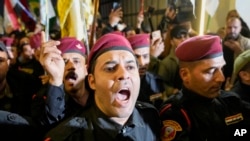The leader of an Iranian-backed militia tied to repeated attacks on U.S. forces in Iraq is dead, killed in what American officials are describing as a precision airstrike in the heart of Baghdad.
U.S. defense officials, speaking on the condition of anonymity in order to discuss details of the operation, said the midday strike targeted a vehicle outside the headquarters of the Harakat-al-Nujaba militia, killing Mushtaq Jawad Kazim al-Jawari and another militia member.
Al-Jawari, also known as Abu-Taqwa, "was actively involved in planning and carrying out attacks against American personnel," one official told VOA, describing the U.S. strike as "necessary and proportionate."
"No civilians were harmed. No infrastructure or facilities were struck," the official added.
A second U.S. official declined to rule out the possibility of additional action.
"The United States is continuing to take action to protect our forces in Iraq and Syria by addressing the threats they face," said the second official, who also spoke to VOA on the condition of anonymity.
The U.S. raised concerns about Harakat-al-Nujaba's activities during recent conversations with top Iraqi officials, including Prime Minister Mohammed Shia al-Sudani.
During a call last month, U.S. Defense Secretary Lloyd Austin warned Sudani that Harakat-al-Nujaba, along with Kataib Hezbollah, was responsible for the majority of the recent attacks on U.S. troops.
A Pentagon readout of the call also noted that Austin conveyed that the U.S. "reserves the right to respond decisively against those groups – to address threats and attacks against U.S. and coalition personnel."
The U.S. has also designated Harakat-al-Nujaba as a terrorist organization.
Still, Thursday's strike by the U.S. in Baghdad drew criticism from Iraqi officials.
An Iraqi military spokesman called the strike "a blatant aggression and violation of Iraq's sovereignty and security … an act akin to terrorist activities" in a social media post.
"This action undermines the previously established understandings between the Iraqi Armed Forces and the Global Coalition Forces," Major General Yehia Rasool said on X, formerly known as Twitter. "We view this action as a dangerous escalation and assault on Iraq."
A U.S. defense official declined to respond directly to Rasool's remarks or say whether officials in Baghdad were given any warning.
"Iraq is an important and valued partner," Pentagon press secretary Major General Patrick Ryder told reporters Thursday, promising continued consultation and cooperation.
"The Iraqi security forces have continued to assist in identifying in some cases where these Iranian proxies have conducted attacks against U.S. forces," he said. "This is an important partner to us, and we'll continue to lean into that relationship."
Thursday's operation follows a series of strikes by the U.S. against Iranian-linked targets in Iraq and Syria dating back to October, including airstrikes last month that targeted three locations used by Iranian-linked Kataib Hezbollah in Iraq following attacks on U.S. personnel at Irbil Air Base.
The U.S. has about 2,500 troops in Iraq and another 900 in Syria, charged with helping fight the remnants of the Islamic State terror group.
But since Israel launched a military campaign against Iran-allied Hamas in Gaza following the October 7, 2023, terror attack, Iranian proxy forces have repeatedly targeted U.S. forces in Iraq and Syria to show solidarity with Hamas and Gaza.
U.S. officials told VOA Thursday that since mid-October, Iranian-backed militias have launched 120 attacks against U.S. forces in Iraq and Syria, with the most recent attack taking place Wednesday in al-Tanf, Syria.
In all, attacks by Iranian-backed groups have injured more than 60 U.S. personnel, with at least one U.S. service member suffering critical injuries.
Carla Babb contributed to this report.










